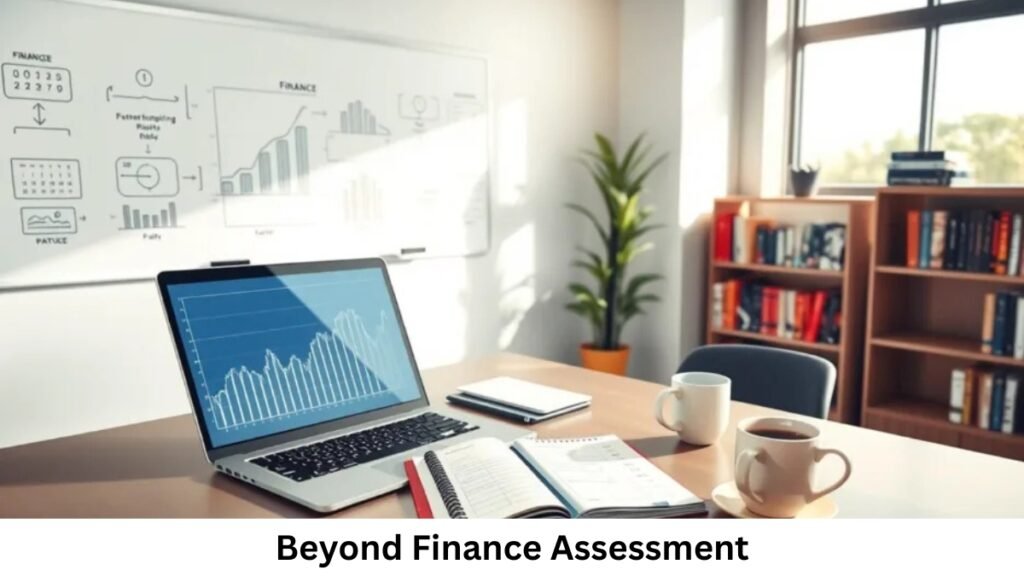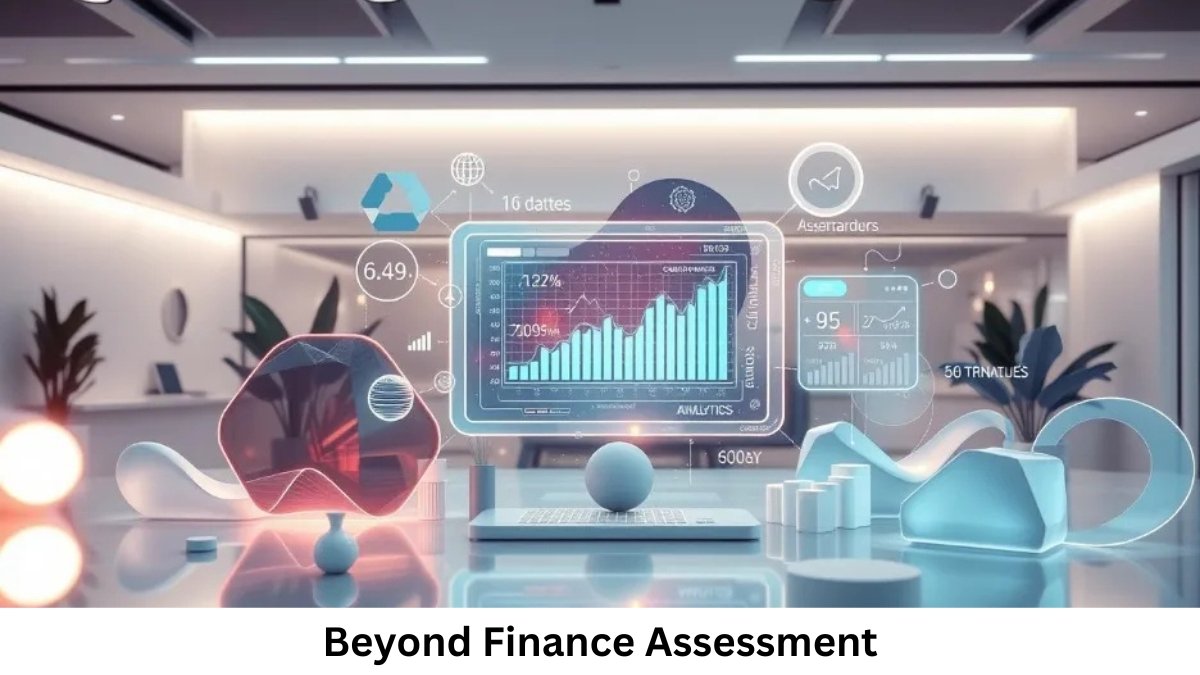What’s up, everyone! I’m back with another deep dive into the finance world, and today I want to talk about something that’s been on my radar lately—the Beyond Finance assessment. As someone who’s passionate about breaking down complex financial topics for you guys, I’ve spent considerable time researching this assessment and why it’s becoming such a game-changer in the finance industry.

I’ll be honest with you—when I first started looking into beyond finance assessment answers, I was surprised by how many people were struggling with this test. That’s exactly why I decided to put together this comprehensive guide. My goal is to give you everything I’ve learned so you can walk into that assessment room feeling totally prepared.
Table of Contents
What I’ve Discovered About the Beyond Finance Assessment Structure
Let me start by sharing what I found during my research into how this assessment actually works. The Beyond Finance assessment isn’t your typical multiple-choice exam that you can cram for the night before. From what I’ve gathered, it’s designed to test your real-world financial thinking, not just your ability to memorize formulas.
Here’s how I understand the structure breaks down:
The Financial Analysis Section
This part really tests whether you can look at financial data and actually make sense of it. I’m talking about interpreting balance sheets, analyzing cash flows, and spotting trends that matter. It’s not just about knowing the definitions—you need to show you can apply this stuff.
Risk Management Component
This section focuses on your ability to identify potential financial risks and come up with practical solutions. What I find interesting is that they present real-world scenarios rather than theoretical problems.
Communication and Decision-Making
This might be the most important part, in my opinion. They want to see if you can explain your financial reasoning clearly and back up your decisions with solid logic.
Why I Think This Assessment Is So Important for Finance Careers
After digging into this topic for weeks, I’ve come to realize that the Beyond Finance assessment is more than just another test—it’s become a serious credential in the finance world. Here’s what I mean by that.
The finance industry is absolutely brutal when it comes to competition. I’ve written about this before, but it’s worth repeating: employers are looking for people who can prove they have practical skills, not just theoretical knowledge. When you nail your beyond finance assessment answers, you’re essentially proving that you can handle real financial challenges.
What really caught my attention during my research is how companies are using these assessment results. I found that many employers now consider strong performance on this assessment as valuable as relevant work experience. That’s huge if you’re trying to break into finance or level up your current position.
From my perspective as someone who writes about career advancement, I see this assessment as one of the smartest investments you can make in your professional future. The skills you develop while preparing for beyond finance assessment answers will stick with you throughout your entire career.
My Take on the Essential Prerequisites
I always like to be straight with you guys about what’s really required versus what’s just nice to have. After researching the Beyond Finance assessment thoroughly, here’s my honest assessment of what you need before diving in.
Educational Background
You don’t necessarily need a finance degree, but you absolutely need a solid understanding of financial fundamentals. I’ve seen people with economics, business, or even accounting backgrounds do well on this assessment.
Technical Skills You Can’t Skip
Based on everything I’ve learned, you need to be comfortable with:
- Advanced Excel functions (seriously, practice this)
- Basic financial modeling
- Financial calculator operations
- Statistical analysis concepts
Experience Factors
While work experience helps, I don’t think it’s a deal-breaker if you don’t have years of finance experience. What matters more is your ability to think analytically and solve problems systematically.
What I’ve Learned About Beyond Finance Assessment Answers
This is where things get really interesting. During my research, I discovered that successful beyond finance assessment answers follow certain patterns that I want to share with you.
Scenario-Based Questions
These make up a huge portion of the assessment. You’ll get real business situations where you need to analyze financial data and recommend actions. What I’ve learned is that they’re not looking for perfect answers—they want to see your thought process.
Technical Problem-Solving
You’ll encounter questions that require calculations, but here’s the thing I found crucial: showing your work is just as important as getting the right answer. They want to understand how you approach problems.
Case Study Analysis
These are longer, more complex problems that test multiple skills at once. From what I understand, time management is critical here because these questions can easily eat up your entire allotted time if you’re not careful.

My Proven Preparation Strategy
Okay, here’s where I get to share the study approach that I believe works best based on everything I’ve researched. I’m calling this my “layered learning” method because it builds skills progressively.
Phase One: Foundation Building (Weeks 1-2)
I recommend starting with absolute basics, even if you think you know them. Review financial statement analysis, key ratios, and fundamental concepts. Don’t skip this step—I’ve seen too many people struggle because they assumed they had the basics down.
Phase Two: Practical Application (Weeks 3-4)
This is where you start working with real financial data. I suggest using publicly available company reports to practice your analysis skills. The goal is to get comfortable interpreting actual business situations.
Phase Three: Timed Practice (Weeks 5-6)
Start taking practice assessments under timed conditions. This phase is crucial for developing the time management skills you’ll need for successful beyond finance assessment answers.
Phase Four: Weak Point Focus (Week 7)
Use your practice results to identify areas where you’re struggling and dedicate extra time to those topics.
Common Challenges I’ve Identified (And How to Beat Them)
Through my research and conversations with people who’ve taken this assessment, I’ve identified several recurring challenges that trip people up. Let me share these with you along with my recommended solutions.
Time Pressure Panic
This is the big one. Many people know the material but freeze up when they see the clock ticking. My advice? Practice under pressure regularly. Set shorter time limits during your practice sessions so the actual assessment feels more manageable.
Overthinking Simple Questions
I’ve noticed that analytical people (which describes most finance folks) tend to overcomplicate straightforward questions. Sometimes the obvious answer really is the right answer.
Technical Skill Gaps
Don’t let weak Excel skills derail your beyond finance assessment answers. If you’re not comfortable with financial functions, pivot tables, or data analysis tools, address this early in your preparation.
Communication Clarity
Remember that someone else needs to understand your reasoning. Practice explaining your thought process clearly and concisely.
Key Topics I Believe You Must Master
Based on my analysis of the assessment content, here are the topics that appear most frequently in beyond finance assessment answers:
Financial Statement Analysis
You need to be able to quickly identify trends, calculate ratios, and draw meaningful conclusions. This skill shows up everywhere in the assessment.
Cash Flow Analysis
Understanding how cash moves through a business is absolutely critical. Practice analyzing cash flow statements and identifying potential issues.

Investment Evaluation Techniques
Learn NPV, IRR, payback period, and other investment analysis methods. You’ll need to compare different investment options and justify your recommendations.
Risk Assessment and Management
Develop a systematic approach to identifying and evaluating different types of financial risks. This topic appears in multiple sections of the assessment.
My Assessment Day Game Plan
I want to share the strategy I would use if I were taking this assessment myself. This approach focuses on maximizing your performance while managing stress and time pressure.
Pre-Assessment Routine
- Get a full night’s sleep (seriously, don’t underestimate this)
- Eat a proper breakfast with protein and complex carbs
- Arrive early to settle in and get comfortable
- Do a quick review of key formulas, but don’t try to learn new material
During the Assessment Strategy
- Read every question completely before starting your answer
- Budget your time across all sections at the beginning
- Start with questions you feel most confident about to build momentum
- Show your work on calculations—partial credit can save you
Time Management Approach
- Allocate time based on point values, not question difficulty
- Set mini-deadlines for yourself throughout the assessment
- Don’t get stuck on any single question for too long
- Save time at the end for reviewing your beyond finance assessment answers
How I’d Use Assessment Results for Career Growth
Here’s something I find really interesting about this whole process—the value doesn’t end when you finish the assessment. Strong results on the Beyond Finance assessment can become a powerful tool for career advancement.
Resume and LinkedIn Enhancement
I’d definitely add strong assessment results to my professional profiles. Quantified achievements always stand out to employers and recruiters.
Interview Talking Points
Your beyond finance assessment answers demonstrate concrete skills that you can discuss in interviews. It’s much more compelling than just saying you’re “good with numbers.”
Negotiation Leverage
Proven competency through third-party assessment gives you solid ground for salary negotiations or promotion discussions.
Professional Development Planning
Use your detailed results to identify exactly where to focus your continued learning efforts.
My Final Thoughts on Assessment Success
After spending weeks researching this topic, I’m convinced that success with beyond finance assessment answers comes down to three things: thorough preparation, practical application of concepts, and confidence in your abilities.
What I find most encouraging about this assessment is that it rewards actual understanding over memorization. If you focus on truly grasping financial concepts rather than just cramming facts, you’ll be much better prepared for both the assessment and your future finance career.
Remember that this assessment is designed to identify people who can think critically about financial problems and communicate their solutions effectively. Those are exactly the skills that will make you successful in any finance role.
I genuinely believe that investing time in mastering beyond finance assessment answers is one of the smartest career moves you can make in today’s competitive finance landscape. The preparation process itself will make you a better financial thinker, and strong results will open doors you might not have even known existed.







1 comment